- Home
- Chris Wraight
The Lords of Silence Page 17
The Lords of Silence Read online
Page 17
‘Tell me your name,’ he said, summoning up as much of his old sense of command as he could.
‘Captain Dantine,’ the man replied, looking terrified.
‘No, that’s my name. Just tell me your–’
‘I am dead. I have no heart. I am a curse and a warning.’ The man smiled, a sick grin that exposed gums as red as heartsblood and black holes where the teeth should have been.
That was the last time. Now Dantine ignores the crowds that fill Solace’s corridors. He bumps into them and they say nothing. He shouts at them and they do not hear him. Sometimes he just shouts anyway, hurling out his pain at the ship around him. The noise sinks into the dark metal, is gulped up by it and is dissipated. He stops when he can no longer breathe, bent double, spitting up blood onto the spongy deck.
Eventually, he finds his way to Philemon’s sanctum. He has learned a little of the Tallyman, overheard from the whispers of others. After Vorx, who is referred to like some distant kind of god, Philemon is the most well-known of the Unbroken to the bilge-dwellers. They see him almost like a priest, a distant intercessor on their behalf, though Dantine himself thinks that this is confused and that none of the monsters who run this ship really care anything much for the Unchanged, as they call them – the ones who never took the corrupted gene-seed of the Fourteenth Legion and were thus morphed into diseased demigods.
Dantine has passed the door to Philemon’s realm on a number of occasions, each time when heading in a different direction. The place does not seem deeply rooted – one day, it will be found nestled below the main engine chambers; on another, it is located higher up, past the capillaries leading to the bridge. On this day, he stumbles across it after walking through the chambers of the rank-and-file Unbroken, the rooms like pig pens that house the many warriors of this vessel in their torpor.
He pauses before the door. It is an archaic thing – a wooden-planked panel, bound by rusted iron in swirls that look wrong. It opens before he even pushes against it, and a blush of pale-green mist hisses up from the deck across his bare feet. On the far side, the air is like rancid cream, thick and translucent. He sees things staring at him from high perches – the grotesque Little Lords, gurning and burping. The smell is unbelievable, even for this ship.
Locked inside some kind of glass chamber, a half-bald crow hops on its perch to fix a jewelled eye on him. There are lots more of these chambers, half-visible in the miasma, all different sizes and shapes.
‘Abomination,’ the crow says.
Dantine stares at it. The creature’s beak curls like a long prehensile finger, and the effect is obscene. He should be revolted by the creature. He should try to kill it. Instead, though, he realises that he finds himself merely curious. He repulses it more than it repulses him. He wonders why this is.
‘You do not have a soul, mortal,’ comes a voice from the smoke and murk. ‘It cannot feed on you, and so it is disgusted by you.’
The speaker emerges, limping out of the haze. He wears a long cowl that casts his face into shadow. His armour – for they all wear armour, these monsters – is as lumpen and misshaped as Vorx’s, though free of the maddening numeric scrawl. Philemon’s numerology is conducted on parchment, and reams of it tumble from every surface of this humid room, gently rotting and cracking and eroding.
‘This is the currency of the universe,’ he says. ‘Not coin, not worlds. Souls. This is what we fight over. The strongest become stronger by them, the weaker are consumed. You, though, have been made irrelevant. You are a bystander in the game. You are despised by all sides. If we sent you back to your old masters now, they would burn you before you could tell them where you came from.’
‘Better to burn than be damned,’ mutters Dantine wearily.
‘I wonder if anyone ever really believed that,’ says Philemon, placing a vial carefully on one of his many lopsided shelves. ‘I suppose some must do, or you would not be able to staff your Inquisition.’
Of all the many terrors and horrors on this ship, perhaps the worst has been the way these creatures talk. Their voices are achingly hard to listen to – bubbling with phlegm and grating across ancient withered vocal cords – but it is the mundanity of their discourse that chills him. They murder without a thought. They infect, they destroy, they mutilate themselves and their servants, they create this stinking, terrible realm in which to squat and vomit, and yet their words are so calm, so turgid, so consumed by the trivial.
The Tallyman comes closer, and Dantine smells his rotten-egg breath.
‘You had it easy on Najan,’ Dantine says. ‘The Consuls will fight you.’
‘Yes, that is what we hope for.’
‘I hope they kill you all.’
Philemon shoots him a dry smile, and it makes one of the boils on his upper lip burst. ‘Let me tell you the strength of this vessel,’ he says. ‘It has weapons on it capable of rendering cities to dust. It has bombers, Dreadclaws, heavy armour. There are things locked up in the dungeons here that you would not believe unless you saw them. Some of them frighten me.’ Philemon chuckles, and the crow hops from one claw to the other. ‘The Kardainn are seven-strong, and there are three further squads of Terminators. Thirty-two squads of Unbroken fight under Vorx, another twenty-four under the Gallowsman. Some have given in to possession, and some have so many Gifts they are like living diseases. There are thousands of Unchanged who can fight harder and longer than any human. Some of them are almost impossible to stop once they get going, and we are so very good at getting them going. That is strength, captain. That is terrible strength. You have not seen it unleashed yet, so do not place so much faith in those who have already failed you once.’
‘They would have come. In time.’
‘If any still live.’
The crow is looking at him all the time. Dantine half knows what it is – a ghost, a spirit, a ghoul. Many times, while fighting on far-off worlds, the mud of trenches thick on his boots, he had heard stories of such things. It was never easy to disbelieve them, and now it is impossible. He is inside a dream now. A dream where all his darkest imaginings are made into hard-edged reality, and insanity has solidified into what counts for sanity.
Dantine glances about him. He sees complex calculations traced in brown ink on thick parchment. He sees rusty devices – armillary spheres, sextants, chronometers – half-covered in mildew-spotted cloth.
‘You call us ignorant,’ he says, trying to sound defiant. ‘And yet, look at you. Look at the conditions you live in. Do you not disgust yourself when you pass a mirror? Do you not see what you could have been?’
The crow laughs. Dantine tenses, ready for a blow from the armoured monster, but it never comes.
Philemon looks thoughtful. ‘But I was in the warp,’ he says. ‘When we were becalmed. I still remember. I scratched the days on my armour, one after the other.’
Dantine listens. He doesn’t know what the monster is talking about, but says nothing. The crow listens. The Little Lords still their quarrelling, and they listen too.
‘When the Destroyer came, I resisted it. We all did. We had been trained for it and we had resisted everything, up until then. Defiance, or else death. Every Legion taught that to some degree, and we taught it more than most. I thought there was nothing I could not endure that did not kill me.’
The Tallyman is not focusing now. He is witnessing events far away.
‘But we were out of time, in the end. There were no days to mark anymore. The pain was eternal, no beginning to it, no end. We were just… part of it. Forever. And I still ask myself, now, what really happened. Did we give in? I don’t know. Typhus tells us we overcame it, and in taking it within ourselves, we transformed it. We no longer feel it. We bring the lesson of that to the universe – accept corruption, let it pass within you, move beyond it. We have been doing it for a very long time. You forget, after a while, that there was another life you had.
That is less than a memory now. Less than a shadow. But not quite dead yet. Every time I see one of you, a part of it comes back.’
‘You were made to protect us,’ Dantine says.
‘They were. Never made for that!’ the crow blurts. ‘They were made. To end the galaxy.’
‘So what do I see when I look in the mirror?’ Philemon asks, ignoring the daemon. ‘I do not look, so I do not know. Perhaps the sight would pain me. I suspect it would not. You don’t look so good yourself. I suggest you stay away from them too.’
‘Don’t you want, though…’ Dantine ventures, trying one last time, probing at anything that might be a weak point. A part of him just wants to know. ‘A way back?’
Philemon smiles, a gesture that exposes dark-purple gums. ‘There are no ways back,’ he says. ‘That is the only unchangeable fact of the universe. Even the gods do not break that law – tread the path to its end or tread no path at all. There are no resting places. There are no ways back.’
Dantine stares at him, shivering a little. The tone of finality chills him. He would like to imagine that the monster expresses something like remorse in those words, but he cannot detect any. He thinks then that they have indeed been driven mad, and that they now no longer see the world as it is, but as some kind of impenetrable mental prison. They imagine themselves masters of their fate but are instead puppets of a greater power, mouthing religious words that mean nothing and worshipping a deity that, if it even exists at all, can care nothing for them or any sentient thing, for it is just a consumer of these souls, an engine for which the living are merely fuel.
But then there are many in the universe of whom such things could be said. Perhaps the souls they toy with are indeed the only currency there is, and all players, whatever allegiance they claim, accept the same stakes at the same table.
So does the heretical thought slip in for the first time, like a sigh of hearth-warm air over an open threshold.
He looks up at the Tallyman’s ruined face.
‘They’ll kill you,’ he says. ‘The Emperor’s Angels. They’ll kill you all.’
‘They might,’ says Philemon. ‘But then, as you’re discovering yourself, there are worse things than an honest death. So we’ll see. We’ll see it all, in the end.’
It’s two days, standard, before the comm-signal comes in from the Ayamandar. That is a long time to contemplate a course of action, even for a Legion so bound up in ritual and portent. Perhaps they have consulted with some other entity at distance, but it would take longer than that to send and receive anything using the astropathic choirs, so it remains likeliest that they were just thinking things through.
Vorx spends most of that time on the bridge, motionless, watching the opposing ship as it circles around them slowly. He is undisturbed by the bridge crew, who are used to his obsessions, and limp and scuttle around him as if he were just another part of the ship’s structure.
Only the Little Lords dare to impose themselves, breaking his concentration. On each occasion, he stoops to pick them up and they coo and snicker at the attention. They extend long black tongues to lick at the old wounds on his armour, and they spend hours clumsily attempting to fix the long rents in his decaying ceramite.
Eventually, something lights up on a panel, and an Unchanged attendant with red rings under empty eye sockets scrabbles around for a decoding filter.
Long before he has done so, Vorx has interpreted the runes piped to his internal system. He gives some thought to subtext, for the senders are particular about inserting multiple layers of meaning to even the basest missives, and he extrapolates what he can.
The results are pleasing enough – no overt insults, no overt threats. It is refreshingly pragmatic – perhaps, he thinks, that is the way things will be from now on.
He stirs himself. A Little Lord is dislodged from his shoulder and slithers down the ridged edges of his plate. Hovik is already hauling herself up from the sensor pits in order to be in place for the coming order burst.
‘Summon the Gallowsman, summon the Kardainn-master,’ Vorx says, lumbering back to his throne. ‘Open a channel to Rhoe Twe.’
The bridge of a Death Guard warship is a sluggish place. Orders are followed, but the movements are languid, hampered by the withering of muscle and the slow softening of minds. For all that, commands find their homes in the end, and Solace judders and booms into something a little more lively. Lumens flicker up to operational intensity, and cracked picter lenses flicker back into life.
Out in the void, the Ayamandar is lighting up too. Tiny tongues of flame blurt and throttle in braziers, and its flanks glow with rekindled searchlights. The huge empty caverns of its main thrusters shimmer with the first rush of ignited fuel, then burst out into thunderous activation.
‘Standing ready, lord,’ comes Rhoe Twe’s voice over the comm. ‘Kindling in process. The furnaces will take a while to–’
‘Expedite if you please, Cultivator,’ Vorx says. ‘They are expecting us to lead them.’
The bridge deck flexes a little then, as Garstag clomps his way out from the access doors. Dragan is not far behind, swinging his naked bladed hand, which seems to have grown a little since the slaughter on Najan.
‘We have an answer?’ asks the Kardainn-master, as wary as the others at the prospect of an alliance with heretics.
‘They accept our terms,’ Vorx says. ‘The world is to be taken, its spoils divided in equal shares.’
Garstag laughs. ‘They will have their knives out long before that.’
‘So everyone keeps telling me.’ Vorx sounds a little weary of this, and Garstag has the sense to let it drop. ‘Bring Drez-Uil to me,’ Vorx says to Hovik. ‘And Captain Dantine. The last stage will be the hardest, and I wish to demonstrate that we mean what we say and can do what we claim.’
Solace’s engines are running now, its arteries unclogging with thick shots of tainted promethium. The bellows are cranking up, the pilot lights are flaring into rolling balls of dirty flame. As ever, the old structure creaks and bangs. The Little Lords scowl and put their claws over their ears. They do not like this level of disturbance, and one of them burrows under the feet of the command throne, its claws scraping rapidly on the deck.
‘So what did he say?’ asks Dragan, curious despite himself.
‘The Apostle? That he accepted the tactical situation. For a moment, I almost believed him. Where is Naum?’
‘Proving hard to track down. There are rumours that he’s under the main prow, and I’ve sent twenty of my blades to find him.’
‘Go yourself. I want him in the first wave.’
Dragan nods cautiously. ‘Then it will not be long,’ he says.
‘Not long at all.’ Vorx takes the heart out of the pouch at his belt. It is still wet with blood, still beating. As he handles it, it trembles, and the pace of beats picks up. ‘It knows. Somehow, it knows.’
He looks at Dragan, and there is something there now. A stirring of spirits, rising up from sluggish depths.
‘Fury is coming, Gallowsman,’ he says. ‘Fury is coming to another world.’
VI: The Gate Breaks
Chapter Thirteen
The fleet breaks up, spirals away from the core, splinters like gravel dashed against stone.
The greater number bear down on distant Cadia, carrying desolation to that hated world under the Vengeful Spirit’s shadow, but there are other targets in the grand scheme. Other worlds in the Gate sector are walled and guarded, and other worlds offer threats to the flanks of Abaddon’s advance. Despite its proximity to the Eye, humanity’s borders here teem with life, every half-habitable asteroid carved out and built up into hyper-cities and mega-fortresses, and the High Lords have crammed every single gun tower with precious souls.
The Despoiler’s captains know their assigned roles. Their warp drives reignite, the still-hot enginariums drumming up ag
ain to full potential. Destroyers streak off into the empyrean, followed by the wallowing hulls of the major killers. Daemons shriek and gambol in their wakes, sensing the chasm of reality flexing around them.
The names of their targets are ancient, known to every slave child of the Eye and murmured by every cult-priest over every altar. Cadia. Nemesis Tessera. Belis Corona. Scelus. The rote is a litany of hatred, hissed from chapped and bleeding lips for ten thousand years. Curses are laid on those worlds within the bronze cathedrals of Sicarus, ramping up the hostility of the slumbering warp and rousing its denizens from torpor. They are close together, by galactic standards, huddled within the sclerotic clutch of major warp conduits, each one a citadel and an armoury of the most resilient kind.
Orbital stations bristle with long-range gunnery, and permanent fleets stalk the space lanes above them. Entire armies drill endlessly within mighty barracks, and fresh tanks trundle off never-ending production lines. Outside the Sol System itself, there is no greater concentration of defences in the entire galaxy, and all of them need constant resupply and refuelling. Their machines are never allowed to degrade and their weapons are never allowed to rot. They must be fed with the metal marvels of old Mars. They must be given teeth.
Thus it is that Agripinaa assumes prominence. Agripinaa, the closest great forge world to Cadia. Agripinaa, the source of its finest armaments, its Titan Legions, its heavy armour and its ranged artillery. Agripinaa is an iron world, never at rest, studded with foundries and seas of liquid metal. Its skies are lead-grey, its surface clad in unbroken construction. No hives or habs pucker its ancient surface, only manufactoria, kilometre after kilometre of them, dazzling the mortal mind. Fires vent like daggers of blood, and the dark iron glints hot under the running clouds. Red lightning snaps over the cowled heads of the priesthood’s minions, skittering from one control tower to another in a never-ending, semi-ritual procession. Skitarii maniples travel in machine lockstep across the high causeways, while below, in the pits and the shafts and the wells, the hammers rock, the pistons slide, the wheels turn.

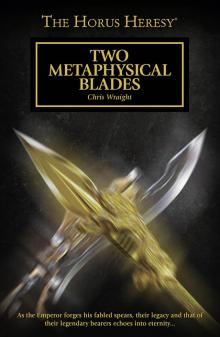 Two Metaphysical Blades
Two Metaphysical Blades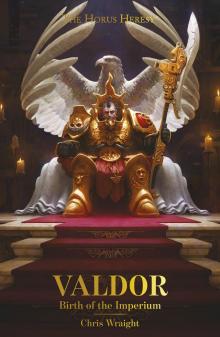 Valdor: Birth of the Imperium
Valdor: Birth of the Imperium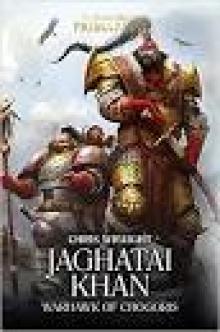 JAGHATAI KHAN WARHAWK OF CHOGORIS
JAGHATAI KHAN WARHAWK OF CHOGORIS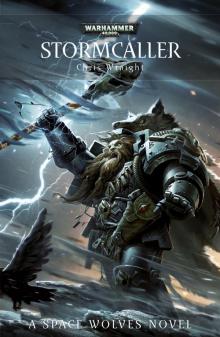 Stormcaller
Stormcaller Child of Chaos
Child of Chaos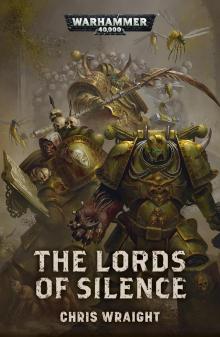 The Lords of Silence
The Lords of Silence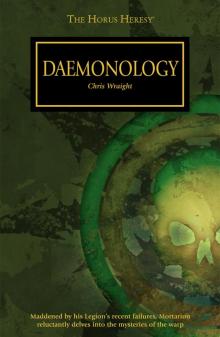 Daemonology
Daemonology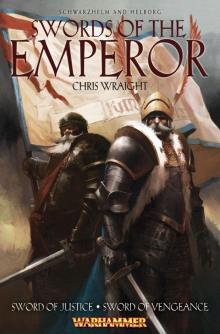 Swords of the Emperor
Swords of the Emperor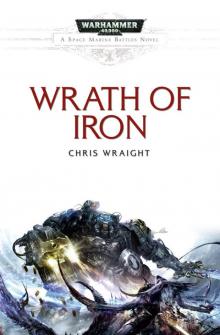 Wrath of Iron
Wrath of Iron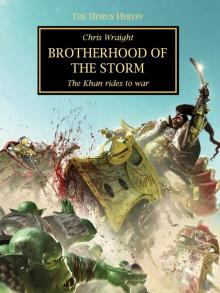 Brothers of the Storm
Brothers of the Storm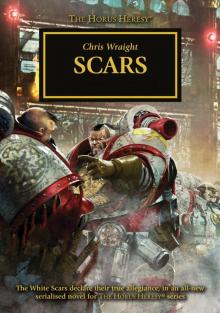 Horus Heresy: Scars
Horus Heresy: Scars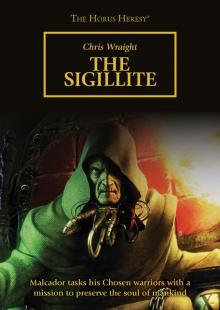 The Sigillite
The Sigillite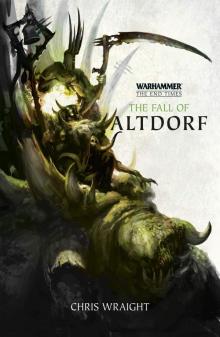 The End Times | The Fall of Altdorf
The End Times | The Fall of Altdorf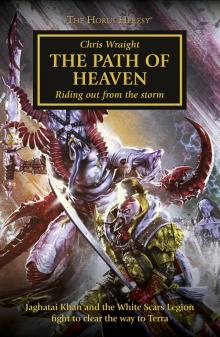 The Path of Heaven
The Path of Heaven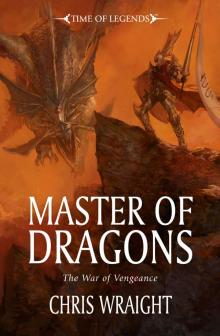 Master of Dragons
Master of Dragons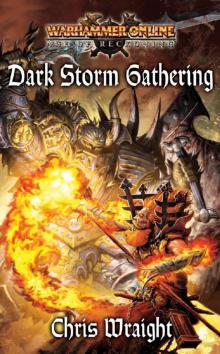 WH-Warhammer Online-Age of Reckoning 02(R)-Dark Storm Gathering
WH-Warhammer Online-Age of Reckoning 02(R)-Dark Storm Gathering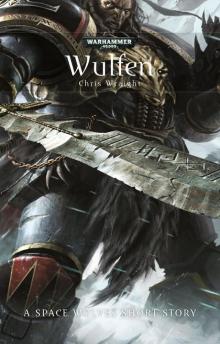 Wulfen
Wulfen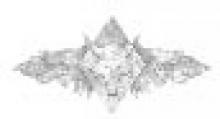 Battle Of The Fang
Battle Of The Fang Onyx
Onyx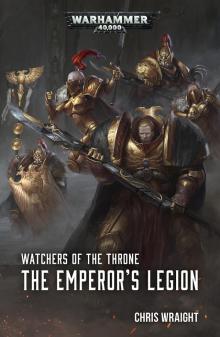 Watchers of the Throne: The Emperor’s Legion
Watchers of the Throne: The Emperor’s Legion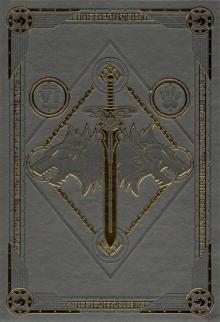 Leman Russ: The Great Wolf
Leman Russ: The Great Wolf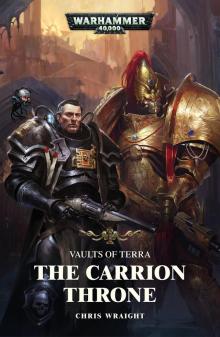 Vaults of Terra: The Carrion Throne
Vaults of Terra: The Carrion Throne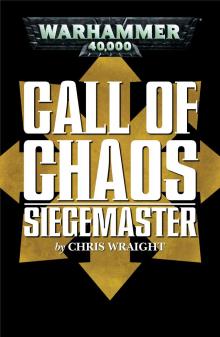 Siegemaster
Siegemaster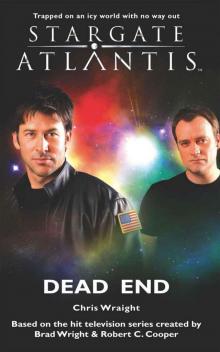 STARGATE ATLANTIS: Dead End
STARGATE ATLANTIS: Dead End Scars
Scars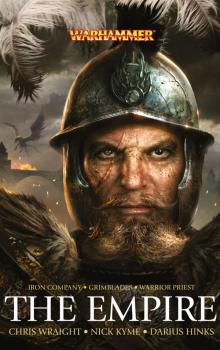 The Empire Omnibus
The Empire Omnibus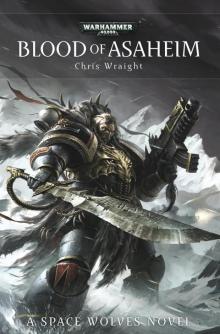 Blood of Asaheim
Blood of Asaheim